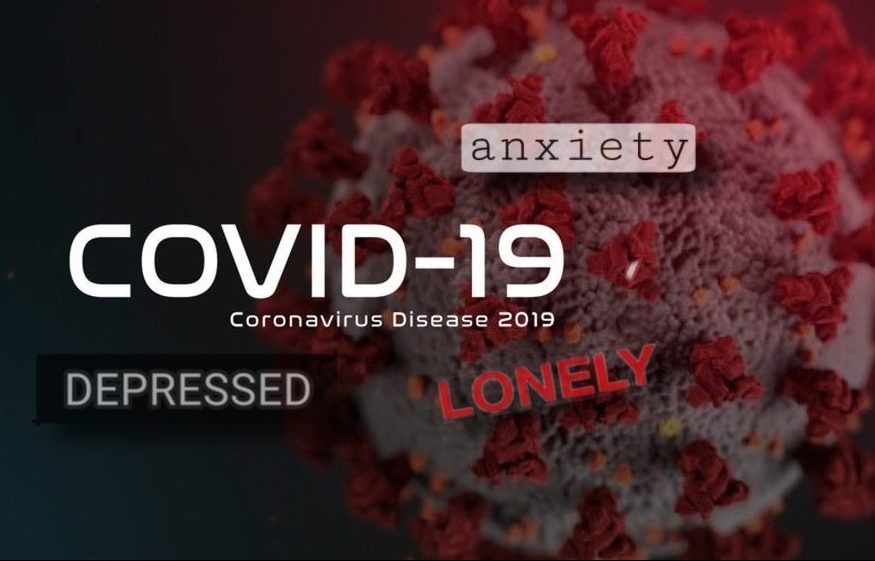COVID-19’s Impact on Mental Health
April 24, 2020
The Coronavirus pandemic has been affecting people in a wide variety of ways, from jobs loss to illness. One impact that is for certain is the effect that it has caused on mental health, specifically for people with mental illness. Many people suffer from anxiety surrounding the fear of contracting the disease or the constant wonder and concern about when this period of our lives when everything has been put on hold will be over. Additionally, during what feels like a never-ending quarantine, the increased loneliness and isolation can worsen and trigger some symptoms.
“Especially being a senior it’s easy to get upset, angry, and disappointed that after 12 years of schooling, we got robbed of the best and last three months, but we are all trying to remember that staying positive and safe is how we are going to move on from all of this,” said senior Ava Accardi.
COVID-19 is also a mental health emergency.
The situation is causing a lot of pain.@CroceRossa is providing support.
? by @BBCWorld pic.twitter.com/hoFCq2befT— IFRC (@ifrc) April 24, 2020
According to a survey published by The Washington Post, nearly half the people in the United States feel as though the Coronavirus is harming their mental health. With each day filled with uncertainty passes, mental health services are becoming increasingly vital. Didi Hirsch Mental Health Services, a nonprofit organization, crisis counselors fielded more than 1,800 calls related to COVID-19 in March, versus just 20 in February.
“Being isolated from your friends and classmates is definitely really hard and lonely. Just to add to that, I’m an only child so I have no siblings to entertain me or anything which really makes this whole isolation much harder,” said senior Peyton Finn.
45 percent of adults say the pandemic has affected their mental health, and 19 percent say it has had a major impact. https://t.co/SasoF789h5
— NAMI (@NAMICommunicate) April 23, 2020
The top mental health concerns include anxiety, obsessions, loneliness, depression, and traumatic stress. One in five COVID-19 related calls included suicidal desire. Something important to remember when attempting to take care of your mental health during this time period is to be mindful of your news consumption. The news can be helpful by encouraging precautions and prevention, but compulsively and obsessively reading and watching about the outbreak can be detrimental to mental health.
“This is a scary time of our lives filled with so much uncertainty about when this will end or who we know could get it next. It has created a really uneasy feeling for me personally seeing all the hysteria on social media and the news,” said junior Cece Williams.
One of the most essential things during this time is to make health your priority. The critical self-care activities are sleep, physical exercise and a healthy diet. Maintaining a sense of normality and routine can also reduce stress. It is also important to find activities that distract you from current events. Being alone with your thoughts is a very triggering thing for many people, so the best way you can help yourself is to find things you enjoy doing that makes this time a little easier.
The #coronavirus outbreak is affecting the way many of us live our lives, and it's normal that this will affect people's mental health. We've gathered some resources that might be helpful at this time ? https://t.co/tuowEB3ehA
— Samaritans (@samaritans) April 23, 2020
Although it is a sad, disappointing, and tough way to end the year, especially for my fellow senior sisters, it is important to remember you are not alone through this or any other challenges you experience in your life. I know this feels never ending, but it is important to keep in mind that everything has a start, a middle, and a finish. Things will go back to normal eventually. We are all in this together, we will get through it together, and ultimately we will become stronger people for it.


Mrs. Jaime Meyer • May 14, 2020 at 5:51 am
There are certain practices that will help with mental health struggles in general but especially during times of crisis. 1. Take your medication. Don’t skip doses or alter the usual schedule for when you usually take it 2. Eat healthily, avoiding sugar and caffeine. Remember that some foods turn into sugar. Avoid them. . Stay hydrated. Absolutely no alcohol. 3. Get a good nights sleep but not too much sleep. Avoid staying up all night and sleeping all day. Take off your PJs, take a shower, brush your teeth and put on real clothes even if you are not leaving the house. 4. Don’t fill your mind with negativity via TV and internet because stinkin’ thinkin’ never is a good thing 5. Get exercise daily 6. Get fresh air. 6. Avoid staying in dark rooms all the time or the opposite ie. overly stimulating yourself with fluorescent lights. Try not to get online in the middle of the night. 7. Spend time with people whose attitude you admire and who approach trials with positivity. 8. Listen to your body. 9. Journal and share it’s contents with someone you trust. 10. Spend at least 15 minutes a day being grateful and articulating your gratitude to God or a higher power than yourself Meditate. I have a close family member who was diagnosed with mental illness as a teenager and now has lived over half a lifetime with its lifelong implications. These practices have helped this person a lot.